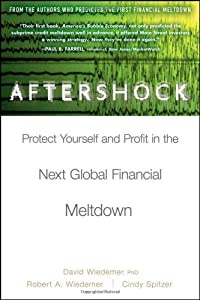Are You Ready for the Aftershock?

I recently read "Aftershock" by David and Robert Wiedemer and Cindy Spitzer, which I would add to my recommended reading list. In the book, the authors lay out the case for what lies ahead as the dollar bubble and government debt bubble begin to burst (the last two bubbles in our so-called "bubble economy").
When these bubbles burst, the authors claim that there are only two main asset classes that you should be invested in: cash and gold - mostly gold. All other asset classes, including stock, bonds, real estate, whole life insurance policies, etc. will suffer significant declines in value.
There may well be very good values in these asset classes at some point in the future, but only after the bubbles have burst. At the core of their concern is the Federal Reserve printing money to try to stimulate the economy - they believe this is highly inflationary and that in the next one to three years, we could see very high rates of inflation - perhaps as much as 10% per year.
I was a little surprised to see real estate included in the "avoid" category. While I can understand the argument as it relates to primary residence and second home (these are really liabilities since they do not put cash into your pocket), I have long believed that investment property that provides positive cash flow would weather an inflationary storm pretty well, since the value of the asset should increase (at least in nominal dollars) and the largest cash outflow (the mortgage payment) is fixed while rent and other expenses would float up with inflation.
The recent sell-off in the stock market and downgrade of US government debt by S&P adds to the credibility of their argument that there really has been no economic recovery since the Great Recession and the stock market increase can be almost entirely attributed to the money printing operations of the Federal Reserve (which include keeping interest rates very low and quantitative easing).
There is a strong likelihood in the current weak economic environment that the government will continue to apply fiscal stimulus (further inflating the government debt bubble) and that the Federal Reserve will continue to apply monetary easing (further inflating the dollar bubble). Both of these will be intended to stimulate economic recovery, but as the Aftershock authors correctly point out, the cure will become the poison in the form of inflation.
Ironically, the "safe haven" investment of choice is US government debt each time the stock market sells-off, but that may soon change to gold (and to a lesser extent the other precious metals) when inflation becomes more significant.
Related articles




